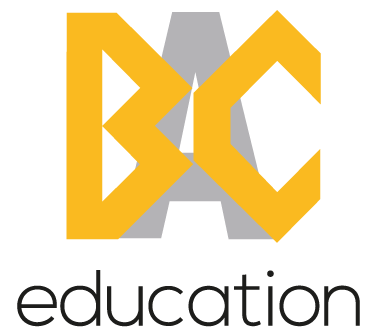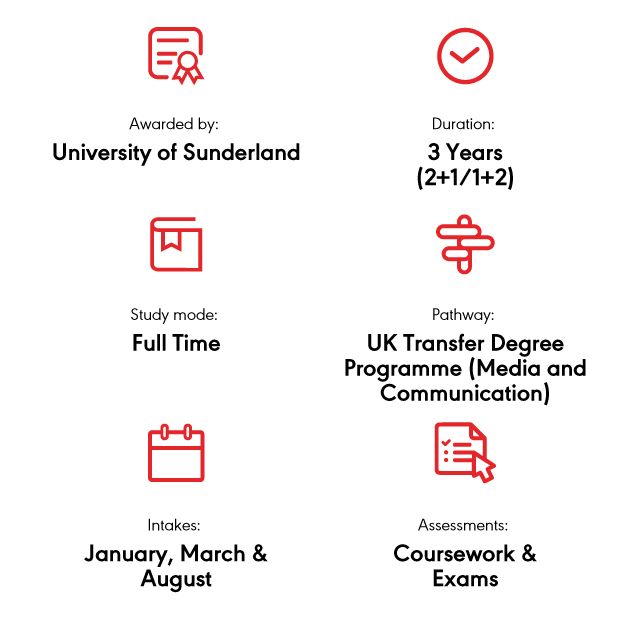BA (Hons)
Mass Communication, University of Sunderland
via UK Transfer Degree (Media and Communication)

Here's the BIG Picture
When you study mass communication, you will learn about various forms of media, such as print, broadcast, and digital. Understanding how these different mediums operate is essential for a career in journalism or public relations. In addition to media forms, you will also explore the role of communication theories and principles in shaping public opinion and influencing societal norms. This knowledge will help you navigate the ever-evolving landscape of media and communication in today's digital age.
University of Sunderland's BA (Hons) Mass Communication is specifically designed to help you develop the skills required to work with current and emerging channels and technologies. You will gain a comprehensive understanding of new media, cultural theory, and popular culture, and their increasing significance in contemporary culture and society, while acquiring new skills using industry-standard equipment.
This degree, under IACT’s UK Transfer Degree (Media & Communication) programme, offers a comprehensive curriculum that blends essential theoretical knowledge with practical skills, preparing you for the challenges of the modern world. Taught by a global creative faculty, this programme allows you to spend 2 years at IACT and 1 year in the UK.
With this Course, You Will:
- Gain a comprehensive understanding of new media, cultural theory and popular culture, and their increasing significance in contemporary culture and society
- Acquire new skills using industry-standard equipment
- Exposed to a broad spectrum of areas in mass communication including public relations, journalism, advertising, photography, videography and digital media, whilst you develop the skills needed to succeed in the media and communications industry
Why choose
University of Sunderland?
The life-changing University of Sunderland is committed to widening participation with their world-leading research, public and private sector collaborations and track-record for providing quality student experiences that result in graduates who are the tomorrow-makers of societies and economies. UOS is one of the top 10 universities in Europe for International Student Diversity (QS World University Rankings: Europe 2024) and is ranked 2nd in the UK for International Student Diversity (QS World University Rankings: Europe 2024). Sunderland has the perfect combination of city and seaside living and is a friendly, diverse, and affordable place for you to live and study. It is the third most affordable city in the UK according to a 2021 ‘Graduate salaries in the UK’ survey conducted by Prospects Luminate, was shortlisted for University of the Year for 2021, the leading category in the annual THE – Times Higher Education – award, and was also named University of the Year for Social Inclusion (The Times and Sunday Times Good University Guide 2021).

How Do I Get In?
- IACT College Foundation in Media Studies –minimum CGPA 2.0;
- IACT Diplomas – minimum CGPA 2.0
- A-Level – minimum of grade D in 2 subjects
- STPM – minimum of grade C in 2 subjects and an average CGPA of 2.0, OR
- UEC – minimum of grade B in 5 subjects
- SAM, AUSMAT or CPU - 5 subjects with a minimum score of 50%, OR
- Matriculation Foundation – minimum CGPA of 2.0
- Other qualifications recognized by the Ministry of Education Malaysia
English Language Proficiency
- SPM 1119 (GCE-O Level) – C6
- IGCSE English – Minimum Grade C
- IELTS – Band 6.0 with a minimum of 5.5 for each component
- Other approved English tests
COURSE MODULES
Year 1
- Computer Graphics
- Media and Cultural Studies
- Media Ethics
- Media History
- New Media Studies
- Photography
- Print Journalism
- Public Relations Practices
- Research Methods
- Writing for the Media
Year 2
- Advertising and Marketing Communications
- Communication in the Globalised World
- Creative Communication
- Film Fundamentals
- Online Marketing
- Popular Culture
Year 3
As per the subjects offered by the university in UK/Australia
Elective Modules*
Choose 1 Track
Track 1: Public Relations
- Corporate Communication
- PR Campaign and Strategies
Track 2: Journalism
- Convergent Journalism
- Publication Production
Track 3: Digital Video Production
- Scriptwriting
- Video Production
Track 4: Advertising and Marketing
- Advertising Campaign Management
- Cross Cultural Studies for Marketing and Advertising
Track 5: Digital Marketing
- SEM and SEO
- Digital Content Marketing
*Subject to availability
MPU Modules
- Appreciation of Ethics and Civilisation (Malaysian students) / Malay Communication 2 (International students)
- Philosophy and Current Issues
- National Language A / Academic Writing
- Malaysian constitution and Society
- Serving our Society (S.O.S)
TUITION FEES
|
MALAYSIAN STUDENTS |
||
|---|---|---|
|
Year 1 |
Year 2 |
Year 3 |
|
INTERNATIONAL STUDENTS |
||
|
Year 1 |
Year 2 |
Year 3 |
You might also like these Courses.
BA (Hons) Communication and Media (Marketing Communication), University of Canberra
Develop skills and knowledge in strategic and brand development, media engagement, advertising and cross-platform digital communication.
Bachelor of Communication (Hons)
Branding & Digital Marketing, Veritas University College
Digital marketing is fast becoming one of the most important skills demanded by employers, as more businesses are being run online. From viral videos and personalised web content to social media influencers promoting their favourite products, you've seen and shared the work of digital marketers and branding experts.
BA (Hons) Media and Digital Culture, University of Essex
Explore how the media shapes social and cultural life, how digital and internet cultures transforms personal and networked interactions, and the relationship between the media, mass politics, and governance.







